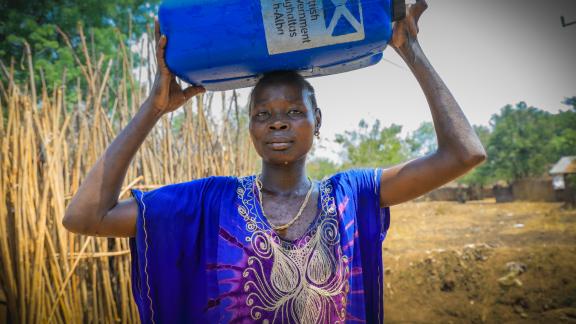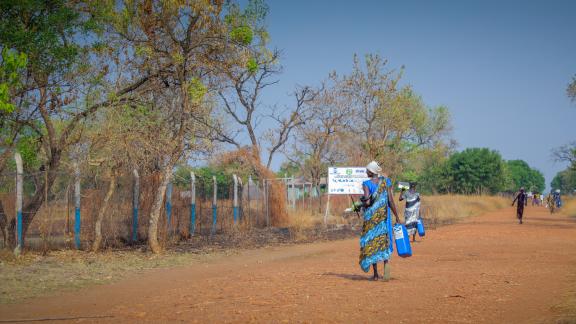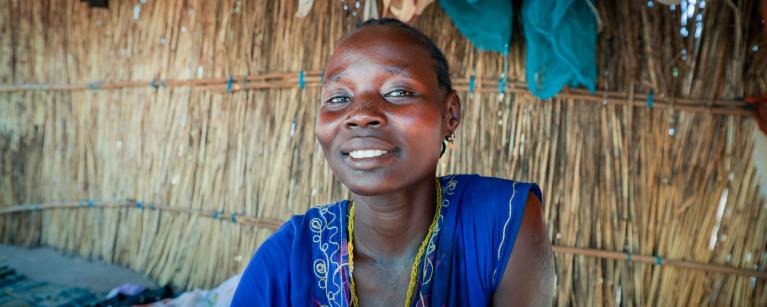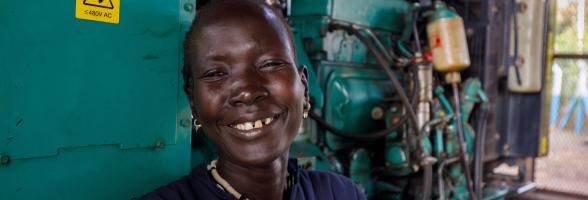In Ethiopia's Gambela region, amidst various refugee camps that shelter about 380,000 refugees, lies Pinyudo camp—a home for those who fled conflict in South Sudan. Here in Pinyudo , we meet Adugk Owitti, a refugee struggling to provide hope for her family amidst many challenges.
In 2012, Adugk, 35, fled the conflict in South Sudan with her four children. As a person living with disability, a legacy of a childhood fire accident, Adugk took a long and risky journey, enduring five days of walking with her children to reach Pinyudo camp, in Gambella, Western Ethiopia.
Despite reaching the safety of Gambella, Adugk struggled to get food for her children.
"Food was really hard to find,” Adugk explained. “My children suffered a lot with no food, and they faced a lot of difficulty. During that time, I had to work so I can help my family by gathering and selling firewood and making local alcohol to earn money,” she added.
Adugk relied on her resourcefulness, recalling her past livelihood of selling firewood to get water and sustain her family's needs, she said: "Before, I used to sell firewood to buy jerrycans for water. Now, Oxfam has provided us with jerrycans and soap, easing the burden of daily survival." Many refugees have lacked such basic essentials for years.

For survival amidst the many challenges they face, some refugees vandalize latrines and sell the corrugated metal sheets used for the construction of the latrines to meet their other critical needs, such as access to food following the reduced food rations in the camps. To curb this practice, Oxfam – with funding from the Scottish Government’s Humanitarian Emergency Fund – is working with refugees to use a different approach to build the latrines that ensures no theft of materials.
“Now, with the help from Oxfam, I have built my own latrine. They provided cement and slabs, which enabled me to construct it. This has not been vandalized", said Adugk.
The absence of proper sanitation facilities was a big challenge for Adugk and many refugees in Gambella. "We used to go outside to use the toilet”, she explained, adding: “When we go out into the bushes at night, we worry that something bad will happen, especially to my children. It's risky to go out for the toilet at night”.
Adugk is grateful that now with self-built latrine close to her own home, there is dignity, and she does not have to worry about the safety of her family, as well as sanitation issues.
Pinyudo refugee camp is home to more than 51,000 people. Oxfam in Ethiopia is providing essential items such as jerricans, soaps, and dignity kits to more than 5,500 refugees across Pinyudo, with distribution continuing. Additionally, initiatives such as latrine construction and water treatment have been implemented, ensuring access to safe and hygienic facilities for all.
Despite the strides made in enhancing living conditions, Adugk acknowledges the persistent challenges she faces as a person with a disability. "I face discrimination because of my disability," she laments, highlighting the ongoing barriers to full inclusion and participation within the community.
Nevertheless, Adugk remains undeterred, steadfast in her resolve to fulfill her responsibilities as a mother and provider for her children.
As Adugk reflects on her journey and the uncertainties that lie ahead, her aspirations remain simple yet profound. "The only change I need is for my children to get a better education," she says. With education as her beacon of hope, Adugk envisions a path towards peace and stability, both for herself and her community.
This project is funded by the Scottish Governement.


